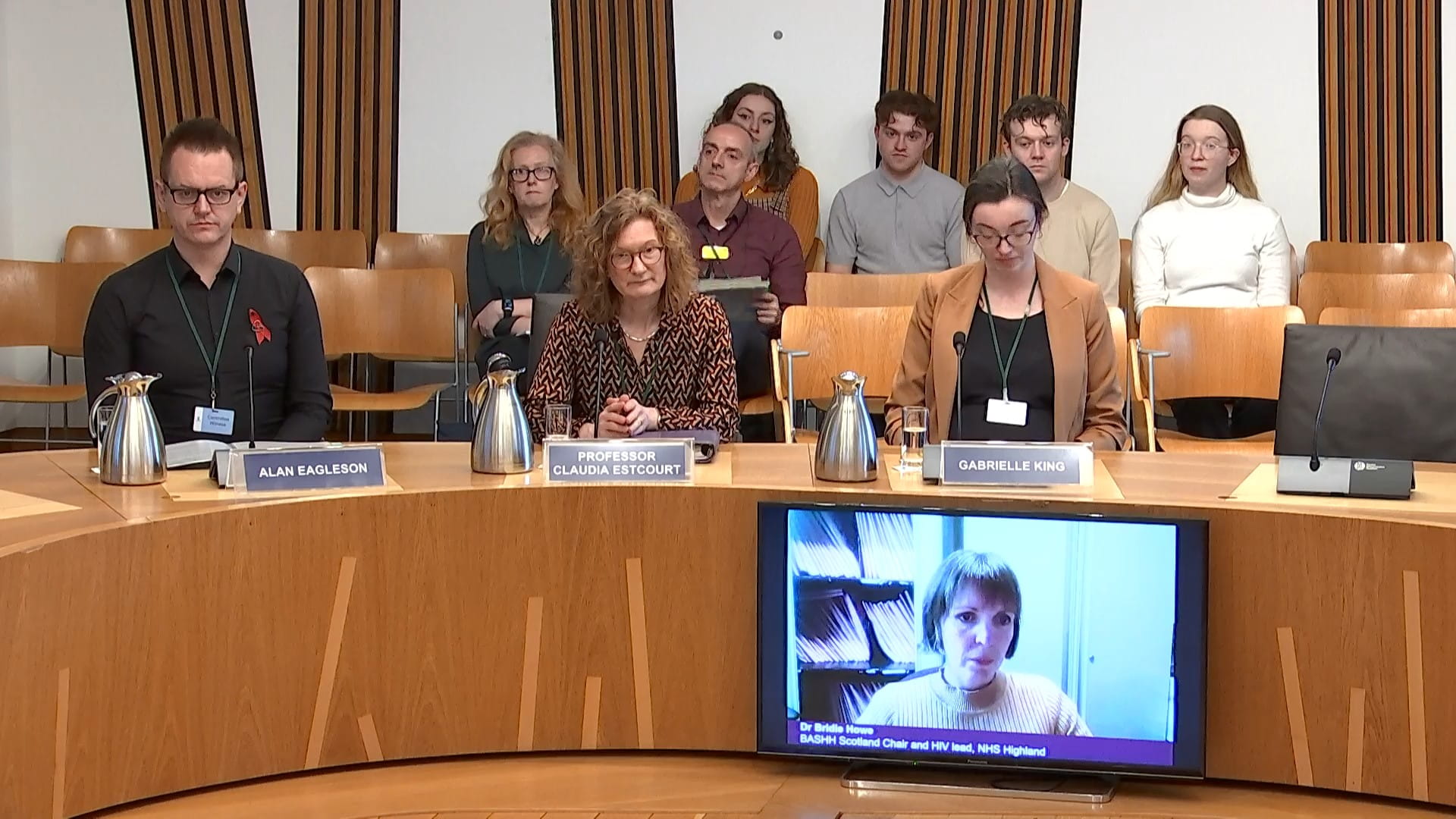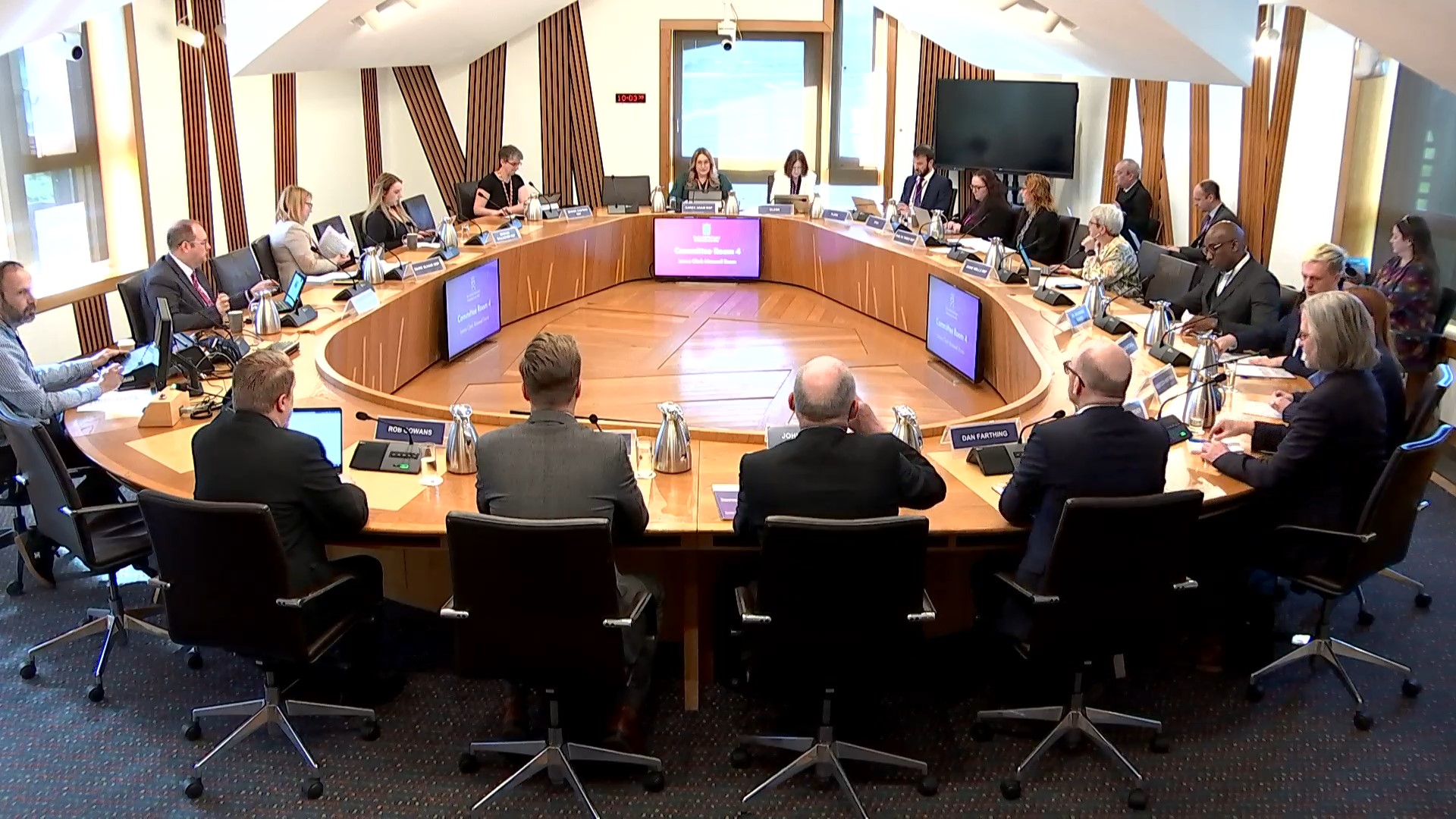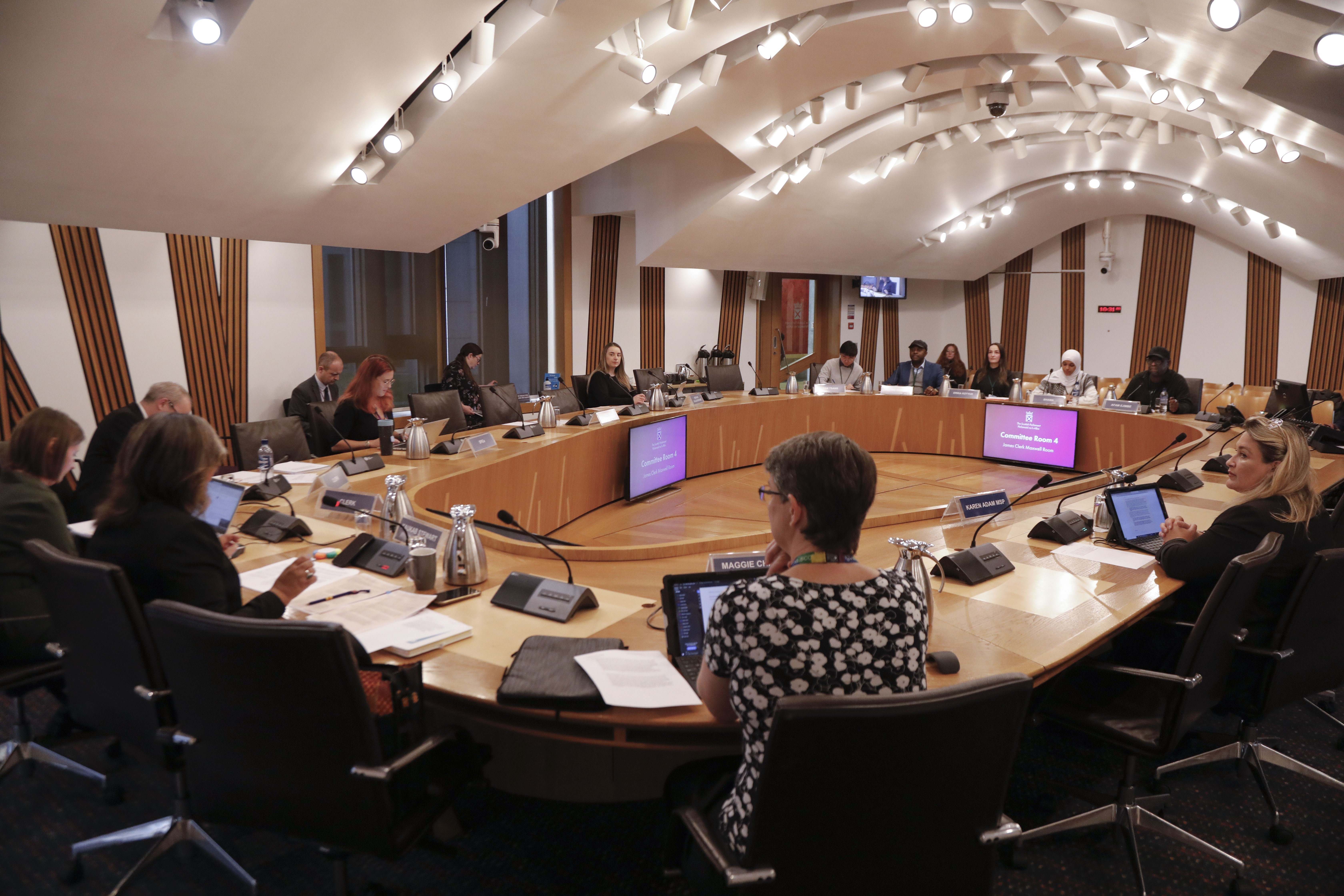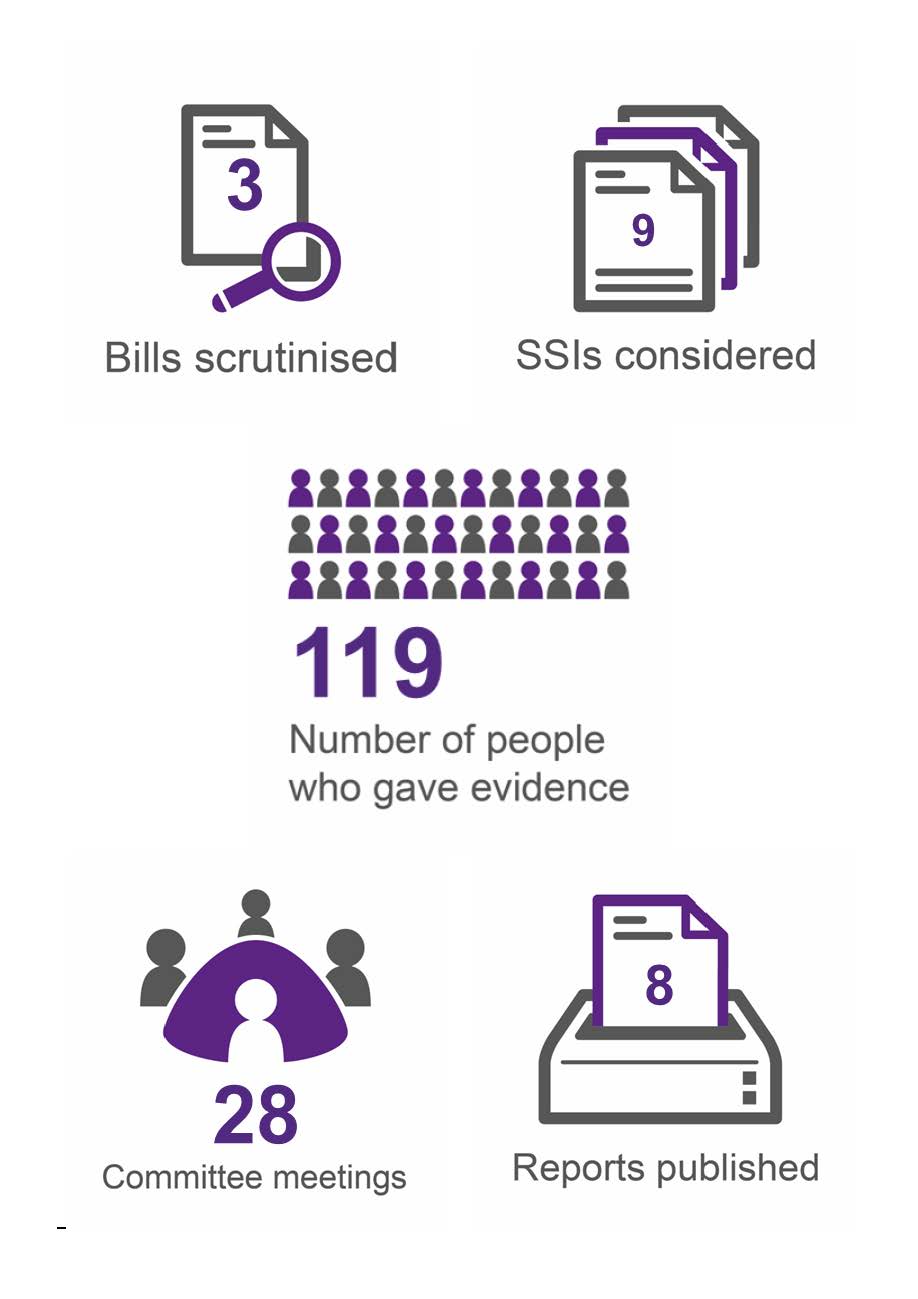Equalities, Human Rights and Civil Justice Committee
Annual Report of the Equalities, Human Rights and Civil Justice Committee for 2023-24
Introduction
This annual report covers the work of the Equalities, Human Rights and Civil Justice Committee during the Parliamentary year from 13 May 2023 to 12 May 2024.
Membership changes
The changes in Committee membership during the reporting year were as follows:
Pam Gosal and Rachael Hamilton both left the Committee on 29 June 2023 and were replaced by Annie Wells and Meghan Gallacher respectively on said date.
Kaukab Stewart, who served as Convener from 25 April 2023, left the Committee on 12 February 2024 and was replaced by Karen Adam as Convener of the Committee on 20 February 2024.
Subsequently Evelyn Tweed was appointed as a Committee member on 6 March 2024.
Fulton MacGregor left the Committee on 5 March 2024 and was replaced by Marie McNair on 6 March 2024.
Meetings
The Committee met a total of 28 times during the reporting period:
6 meetings were held entirely in private
22 meetings included private items
The reasons for taking business in private included to consider the Committee's work programme, to consider draft reports or to consider evidence heard during meetings.
In addition, the Committee held a number of informal, private engagement sessions. These are reflected throughout this report.
Legislation
Bills
Regulation of Legal Services (Scotland) Bill
The Regulation of Legal Services (Scotland) Bill was introduced to the Scottish Parliament on 20 April 2023. The Equalities, Human Rights and Civil Justice Committee was then chosen as the lead committee for scrutiny of the Bill.
Formal evidence sessions at Stage 1 began on 3 October 2023 and concluded with an evidence session with the Scottish Government on 5 December 2023.
The Committee published its Stage 1 Report on 8 February 20241. The response received from the Scottish Government was published on 16 February 20242.
The Stage 1 debate was held on 22 February 20243. Following that debate, the general principles of the Bill were agreed to with the following result:
62 for
29 against
25 abstained
13 did not vote
The Committee were due to start Stage 2 proceedings on 14 May 2024. However, due to delays and a change in the Scottish Government leadership, the timetable for formal consideration has been considerably impacted.
At the time of writing this report, there is uncertainty as to the Scottish Government's revised legislative programme and as such we await an update from the relevant officials.
United Nations Convention on the Rights of the Child (Incorporation) (Scotland) Bill Reconsideration Stage
The United Nations Convention on the Rights of the Child (Incorporation) (Scotland) Bill (UNCRC Bill) was passed unanimously by the Scottish Parliament on 16 March 20211.
However, the Bill did not receive Royal Assent (approval) because the UK Government referred the Bill to the Supreme Court over whether or not the Scottish Parliament could rule on certain provisions.
Following the Supreme Court decision, the Scottish Government were advised that they could make changes to the Bill and ask for the agreement of the Scottish Parliament to have the Bill reconsidered. The Scottish Parliament agreed to a Reconsideration Stage on 14 September 20232.
The Committee took evidence on 31 October 20233 and 7 November 20234. On conclusion of the evidence the Committee wrote to the Scottish Government with its findings and recommendations5.
The Bill proceeded to the Reconsideration Stage and was approved by the Scottish Parliament on 7 December 2023, allowing it to become an Act on 16 January 2024.6
Gender Representation on Public Boards (Amendment) (Scotland) Bill
The Gender Representation on Public Boards (Amendment) (Scotland) Bill was introduced to the Scottish Parliament on 7 November 2023. The Equalities, Human Rights and Civil Justice Committee was then chosen as the lead committee for scrutiny of the Bill.
The purpose of the Bill is to remove the definition of "woman" in the original Gender Representation on Public Boards (Scotland) Act 2018 following decisions made by the Court of Session and a judicial review brought by For Women Scotland.
As the Bill's sole purpose was to update the statute book, the Committee agreed to only take evidence from the Scottish Government. The Committee therefore took evidence on the brief technical nature of the Bill from the Cabinet Secretary for Social Justice at its meeting on 20 February 20241.
The Committee published its Stage 1 Report on 15 March 20242. The response received from the Scottish Government was received on 19 March 20243.
The general principles of the Bill were agreed on 26 March 20244.
No amendments were brought forward for Stage 2 of the Bill, which was concluded on 30 April 20245.
Disability Commissioner (Scotland) Bill
The Disability Commissioner (Scotland) Bill is a Member's Bill, which was introduced by Jeremy Balfour MSP on 8 February 2024. The Equalities, Human Rights and Civil Justice Committee was then chosen as the lead committee for scrutiny of the Bill.
The objective of the Bill is to establish a Disability Commissioner for Scotland, whose primary purpose will be to promote and safeguard the rights of disabled people.
To assist the Committee in its future scrutiny of the Bill, a call for views (public opinion) was launched online on 28 March 20241. Once the call for views closes on 17 May 2024, the Committee will then be able to plan its timetable for beginning formal evidence sessions. Further information regarding the Bill process and proceedings will be available on the dedicated Bill page2.
Subordinate legislation
During the course of the reporting year, we considered the following number of Scottish statutory instruments (SSIs):
4 SSIs subject to the affirmative procedure
5 SSIs subject to the negative procedure
In addition to the subordinate legislation scrutiny outlined above, the Committee also considered two proposals for UK Statutory Instruments under the Statutory Instrument Protocol.
Inquiries/case studies
Asylum Seekers in Scotland
The Committee completed its work on this inquiry during the latter part of 2023 with the publication of its report "The Human Rights of Asylum Seekers in Scotland" on 24 October 20231
A response to the Committee's report and its recommendations was received from the Minister for Equalities, Migration and Refugees on 21 February 20242
The Committee noted that a Chamber Debate3 in the name of Paul Sweeney took place on 26 October 2023 regarding extending the provision of concessionary bus travel in Scotland to include people seeking asylum.
The Scottish Government announced in November 20234 that funding had been set aside for the following year's Budget to continue the scheme.
HIV anti-stigma campaign/achieving zero new transmissions by 2030
The Clerks and the Committee’s former convener, Kaukab Stewart, met with representatives of the Terrence Higgins Trust and Waverley Care on 26 October 2023 to discuss some issues that they wished to highlight to the Committee. The meeting primarily focused on:
Scotland’s HIV anti-stigma campaign
Achieving zero new transmissions of HIV in Scotland by 2030
As part of its work programme discussion at its meeting on Tuesday 19 December 20231, the Committee agreed to hold an evidence session with two panels. Firstly with service provides and secondly with health providers2.
The Committee also agreed to undertake private engagement work with participants who have experience of living with HIV before hearing from the Scottish Government. More on the private engagement is covered later in the report.
Following all evidence sessions and engagement, the Committee wrote to the Minister for Public Health and Women's Health setting out its findings and recommendations3.
The Committee will review the response from the Minister once received and also plans for a follow-up session next year to monitor progress.

Suicide Prevention in Scotland
As part of its work programme discussion at its meeting on Tuesday 19 December 20231, the Committee agreed to undertake a short inquiry into suicide prevention in Scotland.
The focus of the inquiry is to:
Scrutinise the Scottish Government and COSLA’s Suicide Prevention Strategy and Action Plan, its anticipated outcomes and progress to date
Assess to what degree budget allocation to the Strategy and Action Plan are sufficient, and to what degree budget allocations in other areas of Government will assist or hinder its delivery
Establish to what degree the unequal distribution of deaths from suicide across different population groups are being accounted for in the Strategy and its implementation
Determine to what degree the voices of those with lived experience are being meaningfully heard within the Strategy and how it is implemented.
To assist in the Committee's scrutiny and evidence, a short online consultation ran from 1 March to 29 March 2024. A total of 41 responses were subsequently published online2.
The Committee took formal evidence on 23 April3 and 30 April4, as well as undertaking private engagement on 7 May.
The Committee's evidence will conclude on 28 May when we will hear from the Minister for Social Care, Mental Wellbeing and Sport and COSLA.

Pre-Budget Scrutiny 2024-2025
The Equalities, Human Rights and Civil Justice Committee undertakes pre and post budget scrutiny to influence the Scottish Government's approach and assess the decisions taken.
Over the past two years, the Committee has built a solid understanding of human rights budgeting and a useful evidence base and examples of how the principles of human rights budgeting can support budget scrutiny. This reflects the Scottish Government's stated intentions of incorporating the UN Convention of Human Rights into Scots’ Law.
The Committee agreed a three-year pre-budget scrutiny plan to look at each principle of human rights budgeting in turn: participation in year 1, transparency in year 2 and accountability in year 3. Therefore in this reporting year the focus was on participation.
As part of that scrutiny, and to run alongside formal scrutiny, the Committee agreed to explore the impact of the budget from a lived experience perspective. One of the aims of the informal participation was for participants to suggest questions that the Committee may wish to ask the Scottish Government on their behalf.
On Tuesday 12 September 2023, the Committee took part in a deliberative workshop session with a citizens panel of participants from the Whole Family Equality Project (WFEP) who are supported by Capital City Partnership. The session focussed on barriers to participation and what more the Scottish Government and Scottish Parliament could do to improve this.
This was followed by a formal evidence session with stakeholders on 26 September 20231.
On 24 October 20232, the Committee concluded its evidence taking on pre-budget when it took formal evidence from some of the citizen panel members on their deliberation process and priorities. The main aim was to focus on specific questions that the Committee members could then put directly, word for word, to the then Minister for Equalities, Migration and Refugees who was attending to give evidence directly after the citizens' panel.
Following the final evidence on 24 October 2023 the Committee wrote to the Minister for Equalities, Migration and Refugees3 and the Minister for Children, Young People and Keeping the Promise4 with their findings. Respective responses were received on 19 December 20235 and 18 January 20246.
For its pre-budget scrutiny approach this year, the Committee has agreed to focus on transparency. It will consider its formal approach shortly.

Petitions
Petition PE1787: The use of Makaton sign language in the legal system
PE1787 The Use of Makaton Sign Language in the legal system was a continued petition from January 2020 which urged the Scottish Government to ensure that all parts of the legal system use Makaton Sign Language.
The Committee heard from the Petitioner at its meeting on 13 December 20221. Following this meeting, it was agreed to keep the petition open and for the Committee to write to the Scottish Government seeking their views on the evidence received from the Petitioner.
The Committee received a response from the Scottish Government on 13 February 20232, which was considered at its meeting on 28 February 20233.
The Committee agreed to keep the petition open and to write to the Office of the Public Guardian in Scotland, the Mental Welfare Commission for Scotland, the Scottish Courts and Tribunals Service, Police Scotland and COSLA to better understand the number of requests received for the provision of Makaton interpreting and what is being done to support people to communicate in the way that they need.
Police Scotland's response4 indicated it had received no requests for Makaton interpreting in the previous 18 months.
A response5 from the Scottish Courts and Tribunals Service, which includes the Office of the Public Guardian, indicated that they had received one request in the previous 18 months. An interpreter “could not be sourced” but “alternative arrangements were made to allow the case to proceed”.
In their response6, COSLA set out in detail what is being done by Local Authorities around the use of an Appropriate Adult in situations where a person needs support to communicate with the police. The response confirmed COSLA “does not hold data on the number of requests Appropriate Adult Services have received for the provision of Makaton interpreters…[but is]…in the early stages of developing a system for national data collection, in collaboration with the Scottish Government and other stakeholders".
In March 2024, the Committee sought an update from the Scottish Government and received a response on 16 April 20247.
The Committee considered the petition again at its meeting on 23 April 20248 and agreed to close the petition on the basis that the Scottish Government indicated that the issues raised in the petition around accessible communication can be addressed through existing measures. These include the Appropriate Adult scheme, Letter of Rights, Public Sector Equality Duty and can also be covered through legislation including the forthcoming Human Rights Bill for Scotland and the Learning Disabilities, Autism and Neurodivergence Bill. The Committee would like to extend its thanks to the Petitioner for raising awareness of Makaton sign language.
Equal opportunities and engagement
In addition to working closely with the citizens panel as part of its budget scrutiny, the Committee held a number of private, informal engagement sessions throughout the reporting period.
The Committee places great value and learning from its collaboration with, and support from, external organisations and people sharing their views and lived experiences and would like to take this opportunity to express thanks to all those involved.
The Committee also wishes to acknowledge and thank all those colleagues in the Scottish Parliament's Participation and Communities' Team (PACT), the Scottish Parliament's Information Centre (SPICe) and the Scottish Parliament's Communications Office (PCO), without whom our engagement sessions would not be possible.
Thanks also go to colleagues in the Scottish Parliament's Public Information and Resources office who have worked closely with us to ensure translation services and accessibility for those engaging with the Committee.
As part of its inquiry into Asylum Seekers in Scotland, the Committee held private, informal engagement sessions with individuals with lived and ongoing experience of the asylum system in June 2023. These were supported by external organisations and included translation services for Tigrinya, Farsi, Arabic and Somali speakers. Notes from these sessions can be found in the engagement section of the Committee's Asylum Seekers in Scotland dedicated webpage1.
In its approach to Stage 1 scrutiny of the Disability Commissioner (Scotland) Bill, the Committee were keen to increase accessibility as much as possible for those wishing to respond to the call for views.
This included providing easy read versions in printable and downloadable format as well as being able to respond in British Sign Language via WhatsApp. Offline submissions received via email were also accepted. The cross-office approach on this was invaluable as was regular updates from relevant colleagues.
As part of its agreed approach on the HIV anti-stigma campaign/achieving zero new transmissions by 2030, the Committee agreed to hold private engagement sessions with people who are living with HIV. These sessions took place on 19 March 2024 and focussed on the stigma and other challenges experienced. Anonymised notes were recorded but not published.
The Committee's final engagement sessions for this reporting period were the private, informal engagement sessions held on 7 May 2024 as part of the Suicide Prevention in Scotland inquiry.
This engagement consisted of three separate sessions with four external organisations facilitated with our colleagues again from PACT, SPICe and PCO. This joint office approach was once again invaluable to assist the Committee in its scrutiny and information gathering.
